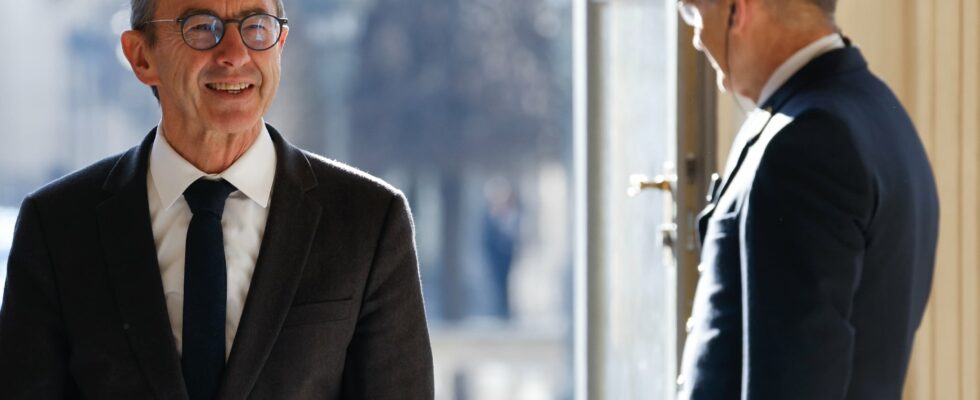Bruno Retailleau wants to toughen France’s policy with regard to immigration, and particularly the regularization of undocumented immigrants. The Minister of the Interior must present a new circular this Friday, January 24 during a trip to Yvelines, supposed to replace the Valls circular, which allows each year the prefectures to regularize through work or for family reasons more than 30,000 without -papers. “The exceptional admission to residence route (AES) is not the normal route of immigration and access to residence. Targeting foreigners in an irregular situation, it must remain an exceptional route,” writes the minister in this news three-page circular addressed to the prefects and revealed by Le Figaro.
Taking a firm line on immigration, Minister LR has announced on multiple occasions his intention to review the Valls circular intended to give the prefectures “the” in terms of regularization on a case-by-case basis of foreigners in an irregular situation. Little known to the general public, since 2012 this circular has allowed a foreigner in an irregular situation to request “exceptional admission to stay” for family, economic or student reasons. It is up to the prefect to accept it or not.
The end of “arm’s length” regularization
Until now, the Valls circular made it possible to resolve a certain number of situations including: providing a solution to bosses who are struggling to recruit and want to regularize employees in order to avoid turnover, a school which is mobilizing for a family threatened with eviction yet well integrated into the village, or even students that a university wants to keep. If the Retailleau circular does not strictly speaking change the criteria for obtaining this “exceptional admission to stay”, it nevertheless clearly asks the prefects to tighten the screw in terms of regularization.
Thus the Valls circular promoted a “lucid and balanced” immigration policy and urged prefects to “fairly take into account human realities” by insisting on regularization criteria. Bruno Retailleau highlights: “the control of migratory flows, in particular by the fight against irregular immigration, and the strengthening of the integration of foreigners in France”. He also insists on the adherence of undocumented foreigners to the “principles of the Republic” including secularism but also mastery of the French language, which will be “favorably assessed” by proof of a French diploma or a language certification.
“The objective is to reduce immigration, to fight against immigration, particularly illegal immigration, and not to regularize it all at once,” declared the tenant of Place Beauvau on Europe 1 this Friday morning. “If we want to reduce this immigration, especially illegal immigration, we must not regularize it in too quantitative a way, because (otherwise) we give a premium to irregularity, to those who have committed fraud,” he added. “There is no right to regularization,” insisted Bruno Retailleau. “I reminded (the prefects, editor’s note) that there was no systematic right, no automatic right, no enforceable right to regularization.”
“We’re going too far”
In 2023, the circular allowed 34,724 people to obtain papers (+ 0.3% compared to 2022), according to data from the Ministry of the Interior: 11,525 for work, 22,167 for family reasons, and a thousand under student status. To be eligible, an undocumented worker must in theory have lived in France for at least three years and have at least two years of work. But in the new circular which will soon be published, Bruno Retailleau writes that “a duration of presence of at least 7 years constitutes one of the relevant integration indices”.
Macronist MP Roland Lescure estimated this Friday on TF1 that the new circular went “too far”. “It goes too far, I think we are going too far,” said the vice-president of the Assembly. “I think we really have to be wary of caricature, and here we are a bit in caricature,” added the Ensemble pour la République (EPR) deputy. “We have to be human and above all we have to be pragmatic”, because there is a “need for labor” in certain sectors, added the former minister responsible for Industry and Energy , considered to belong to the left wing of the macronie, and whose position illustrates the potential tensions on immigration within the coalition which supports Prime Minister François Bayrou.
A call for more severity
“We must not overestimate the legal scope” of this text, comments Gwenaële Calves, professor of public law at the University of Cergy-Pontoise, to AFP. “Regularization on an exceptional basis falls within the discretionary power of the prefect, this circular in no way modifies the other methods of regularization established by law. A circular obviously cannot modify a law,” she adds. “The prefect retains a discretionary role, but his power of appreciation is governed by this circular,” explains Gwenaële Calves. “This circular calls on the prefects to be more severe, but for example the minimum of seven years of stay to be regularized exceptionally can always be lowered if other elements of the file argue in this direction,” she explains.
Then in the Barnier government, the Minister of the Interior sent another strong circular to the prefects at the end of October demanding “results” for “the resumption of control of our immigration”. Provided for by the immigration law promulgated at the beginning of 2024, the update of the list of professions in tension in which undocumented workers can be regularized should be published “at the end of February”, said Sunday the Minister of Labor, Astrid Panosyan -Bouvet.
Still on Europe 1, Bruno Retailleau also announced this Friday that he was planning a future circular on naturalizations “with the same objective”. “The concept of assimilation, we talk about it less and less because we have a breakdown in integration (…) but the civil code is clear, it mentions the word assimilation,” he said . “Assimilate values, assimilate the values of freedom, of believing or not believing, of equality between men and women, the fraternity which is not a religious fraternity, but a republican, civil fraternity,” he listed.
